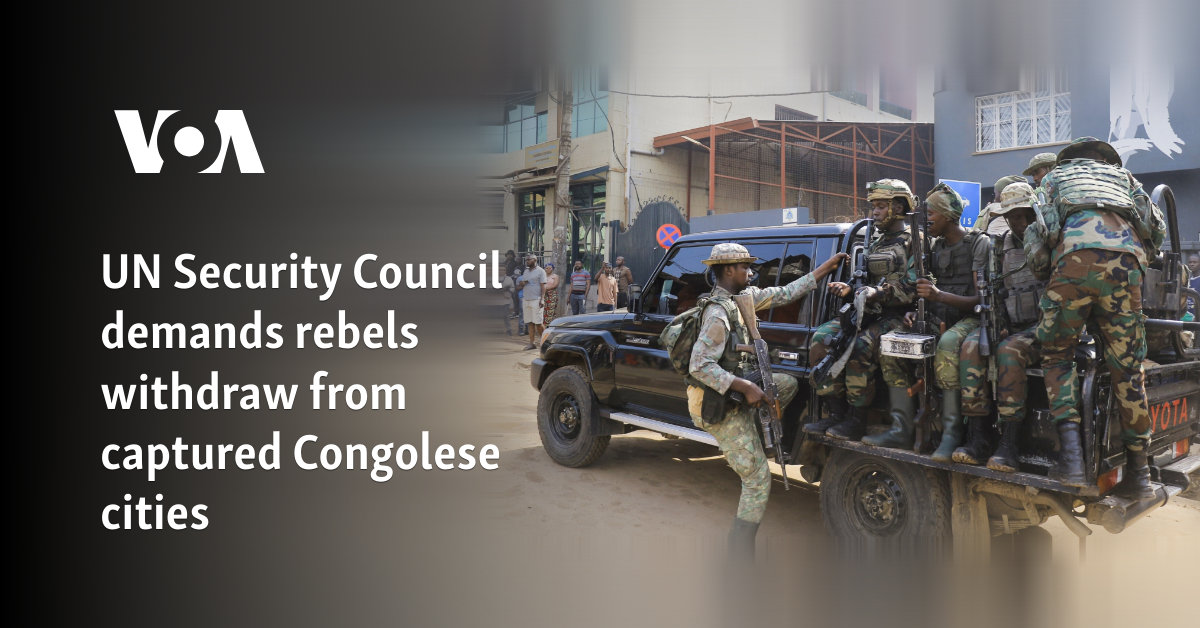The U.N. Security Council unanimously adopted a resolution Friday demanding that the M23 rebels in eastern Congo immediately cease hostilities and withdraw from territories they have seized. The council also threatened sanctions on those who prolong the conflict.
France, which drafted the text, said it sends a clear message that there is no military solution to the conflict in the eastern Democratic Republic of Congo.
“The priority is to reach an effective, unconditional and immediate ceasefire agreement,” Ambassador Nicolas de Riviere said. “A restoration of dialogue is urgent, with support from mediation at the regional level. The sovereignty and territorial integrity of the DRC needs to be respected.”
The resolution also calls on the Rwanda Defense Forces to cease their support “to the M23 and immediately withdraw from DRC territory without preconditions.” Council members accuse the Rwandan Defense Forces of “direct support” of the M23. Rwanda has repeatedly denied allegations that it supports the rebels.
The Security Council also strongly urged the the DRC and Rwanda “to return without preconditions to diplomatic talks as a matter of urgency” and to implement their existing commitments under two regional mediations known as the Luanda and Nairobi processes.
Land grab
Thousands of Rwandan-backed M23 rebels continue to seize territory in the mineral-rich eastern part of the DRC with little resistance from the national army.
Since mid-December, they have focused on the provinces of North and South Kivu, seizing North Kivu's capital, Goma, in late January and moving to South Kivu's capital, Bukavu, on February 14. The rebels have also taken control of other important towns, including Masisi, Sake and Nyabibwe, and have established “parallel administrations” in some of the territories they control.
On Friday, the head of the U.N. mission in the eastern DRC said the rebels appear to have their sights set on the capital, Kinshasa.
“Very public declarations and statements by AFC/M23, clearly repeated over time and including last week, show that the intent is to go up to Kinshasa,” Bintou Keita, the U.N. special representative of the secretary-general in the DRC, told reporters in a video briefing from Kinshasa. “It is our understanding, looking at what is going on in North Kivu, but also the onward push towards South Kivu, and we understand they are pushing a bit further to Tanganyika.”
Rwanda alleges that Kinshasa collaborates with the Democratic Forces for the Liberation of Rwanda, or the FDLR, a Hutu armed group with ties to the perpetrators of the 1994 Rwandan genocide, an allegation the DRC rejects.
“We believe that any outcome that doesn't take Rwanda's security concerns seriously will not offer a sustainable solution to the conflict,” said Rwandan Ambassador Ernest Rwamucyo. “The security challenges posed by FDLR and its splinter groups are of very serious concern for Rwanda. DRC must be held accountable for its continued preservation of FDLR, embedding it in its army, equipping the FDLR with sophisticated weapons and using it as an ally and fighting force.”
In its resolution, the council condemned “support provided by DRC military forces to specific armed groups, in particular the FDLR,” calling for it to stop. The council also urged the parties to rapidly implement “the harmonized plan for the neutralization” of the FDLR and the “disengagement of forces from the territory of the DRC.”
Hundreds of thousands of civilians have been caught up in the fighting. The U.N. refugee agency said Friday that it needs $40.4 million to assist 275,000 internally displaced people in eastern DRC and to support a potential influx of 258,000 refugees and returnees going to neighboring countries.
The DRC government has officially designated the M23 as a terrorist organization, while the United Nations and the United States classify it as an armed rebel group.
Congolese Ambassador Zenon Ngay Mukongo welcomed the council's action but said it came late, after weeks of repeated appeals from his government.
“In this particular case, the council's paralysis gave free rein to the illegal occupation of DRC territory by the Rwandan Defense Forces and their supporters in the AFC/M23,” he said, “in the knowledge that every further day of inaction compromises regional and international peace and security, only strengthens the aggressor, and undermines the United Nations’ credibility.”
On Thursday, the United States unilaterally imposed sanctions on a senior Rwandan official and a spokesperson for a coalition of armed groups that includes the M23 for fueling violence in the eastern DRC.
“We applaud similar actions taken by other member states aimed at compelling Rwanda to return to the negotiating table and bring this violence to an end,” U.S. envoy Dorothy Shea said.
Sierra Leone's envoy offered a lesson to the parties from his country's 11-year civil war in the 1990s. Ambassador Michael Kanu said that at some point the parties realized the conflict would not end on the battlefield and that dialogue was the only viable path to sustainable peace.
“We had to talk with each other in good faith and commit to signing a peace agreement with the necessary political will,” Kanu said. “Talking to adversaries is hard. Perhaps a taboo for some. But we do not make peace with friends, but with adversaries.”
